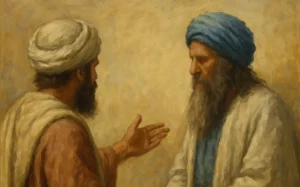Prayers and Current Context
Rav Yitzchak Breitowitz opens his shiur sharing thoughts on the past week in Israel, describing the shift as “miraculous”—specifically the destruction of nuclear capabilities and the prevention of a prolonged, catastrophic war. Without entering halachic debates about Hallel or open miracles, he emphasizes that Hashem is visibly protecting Am Yisrael.
“Hashem gave us a hug. He said: ‘I’m with you. I’m protecting you.’”
In response, we must continue to pray, but also add a Mizmor l’Todah, a psalm of gratitude. The true way to thank Hashem, he says, is not only with words, but by living the life He wants from us: strengthening mitzvot, Torah, and emunah.
Korach’s Rebellion: What He Said — and What He Really Meant
Parashat Korach presents a bold challenge:
“The entire nation is holy. Why do you elevate yourselves over Hashem’s people?”
On the surface, Korach advocates for spiritual equality. Rav Breitowitz acknowledges that there is truth in this claim: all Jews stood at Sinai and heard God’s voice; every Jew has a personal relationship with Hashem.
But Korach’s true intention was not equality. He desired Aharon’s position as Kohen Gadol. His rhetoric was populist, but his motive was ambition and jealousy.
Moshe does not reply directly to Korach’s argument. Instead, he says:
“You are already a Levi. Has Hashem not given you honor?”
That might seem off-topic, but Moshe is exposing Korach’s hidden agenda. He isn’t fighting for others—he is fighting for himself.
Korach as a Revolutionary Archetype
Rav Breitowitz compares Korach’s behavior to historical revolutions:
- The French Revolution spoke of liberty and equality—but brought terror under Robespierre.
- The Russian Revolution promised justice—but led to Stalin’s brutality.
- In Orwell’s Animal Farm, the animals overthrew humans for freedom, only to be ruled by the pig Napoleon, a tyrant.
These are movements that speak in the name of the people but are driven by ego and control.
Korach fits this pattern. He used divine language to cover his lust for authority.
The Real Greatness of Korach
Rav Breitowitz makes it clear: Korach was no minor figure. His greatness was real.
He was from Shevet Levi, of the family of Kehat—the elite Levites who carried the Aron.
His children did teshuvah, survived the punishment, and became the composers of eleven Psalms.
From his lineage came Shmuel haNavi, considered equal to Moshe and Aharon.
Korach, through mystical vision, foresaw this—and misunderstood it.
He thought: If my children are so great, surely I must be meant for greatness now.
But he failed to realize: his role had not yet matured, and he had not yet developed the inner humility needed to fulfill it.
In the Future: Korach Will Be Kohen Gadol
According to Rav Menachem Azariah of Pano, a major Italian kabbalist:
- In the days of Mashiach, the world will return to its original plan of divine justice (din).
- At that time, the entire tribe of Levi will be elevated to the status of Kohanim.
- Korach will then be the Kohen Gadol.
This explains a key point:
Korach’s vision was not wrong. It was early.
He saw the truth of a future reality, but tried to force it into the present, before the world was spiritually ready. His downfall was that he confused future destiny with current entitlement.
Contemporary Conclusion
Rav Breitowitz brings these themes full circle by returning to the present:
We live in a time of both danger and deliverance. The visible protection of Hashem obligates us to respond with gratitude and spiritual growth.
False leaders still arise today—people who speak of “justice” or “freedom” but seek only power. Korach’s strategy is alive in modern rhetoric.
Korach’s story is not just about rebellion—it is about greatness misapplied. His potential was immense, but without humility, he collapsed from within.
“This is the definition of Greek tragedy,” Rav Breitowitz says.
“Not being destroyed by others—but falling because of a flaw inside yourself.”
Korach could have become Moshe, if only he had acquired Hevel—the humility to match his power.
One day, when the world reaches its perfection, he will.

